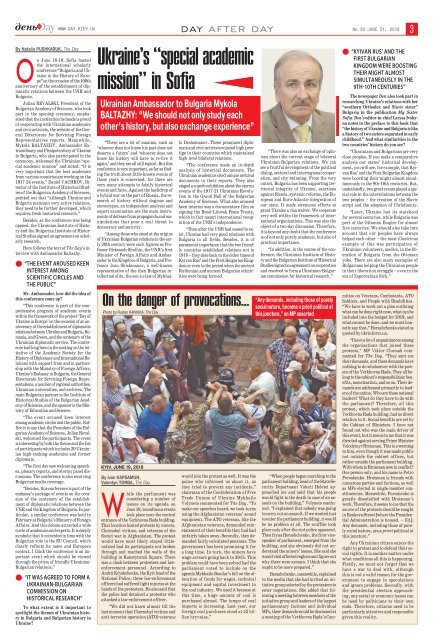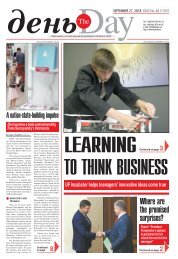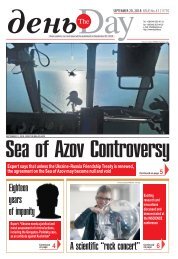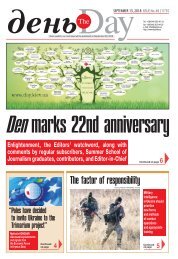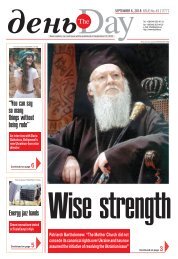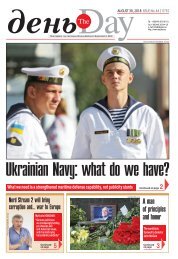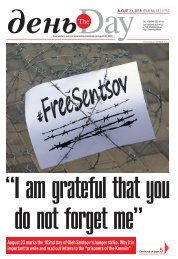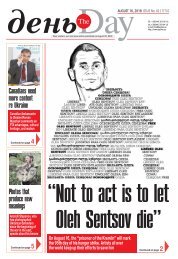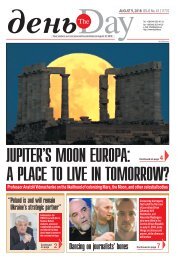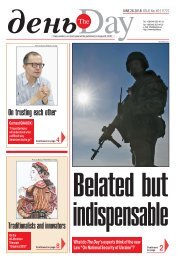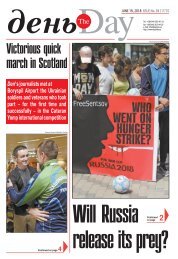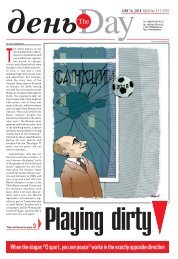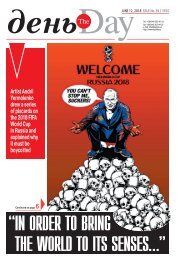You also want an ePaper? Increase the reach of your titles
YUMPU automatically turns print PDFs into web optimized ePapers that Google loves.
WWW.DAY.KIEV.UA<br />
DAY AFTER DAY No.39 JUNE 21, 2018 3<br />
By Natalia PUSHKARUK, The Day<br />
OnJune 18-19, Sofia hosted<br />
the international scholarly<br />
conference “Bulgaria and Ukraine<br />
in the History of Europe”ontheoccasionofthe100th<br />
anniversary of the establishment of diplomatic<br />
relations between the UNR and<br />
Bulgaria.<br />
Julian REVALSKI, President of the<br />
Bulgarian Academy of Sciences, who took<br />
part in the opening ceremony, emphasized<br />
that the institution he heads is proud<br />
of cooperating with Ukrainian academics<br />
and civic activists, the website of the General<br />
Directorate for Servicing Foreign<br />
Representatives reports. Meanwhile,<br />
Mykola BALTAZHY, Ambassador Extraordinary<br />
and Plenipotentiary of Ukraine<br />
to Bulgaria, who also participated in the<br />
ceremony, welcomed the Ukrainian “special<br />
academic mission” and noted: “It is<br />
very important that the best academics<br />
from various countries are working on the<br />
1917-24 events.” Daniel VACHKOV, Director<br />
of the Institute of Historical Studies<br />
of the Bulgarian Academy of Sciences,<br />
pointed out that “although Ukraine and<br />
Bulgaria maintain very active relations,<br />
they need to be further developed, which<br />
requires fresh historical research.”<br />
Besides, as the conference was being<br />
opened, the Ukrainian Institute of History<br />
and the Bulgarian Institute of Historical<br />
Studies signed an agreement on scholarly<br />
research.<br />
Here follows the text of The Day’s interview<br />
with Ambassador Baltazhy.<br />
● “THE EVENT AROUSED KEEN<br />
INTEREST AMONG<br />
SCIENTIFIC CIRCLES AND<br />
THE PUBLIC”<br />
Mr. Ambassador, how did the idea of<br />
this conference come up?<br />
“This conference is part of the comprehensive<br />
program of academic events<br />
within the framework of the project ‘Day of<br />
Ukraine in Europe’ on the occasion of an anniversary<br />
of the establishment of diplomatic<br />
relations between Ukraine and Bulgaria, Romania,<br />
and Greece, and the centenary of the<br />
Ukrainian diplomatic service. The conference<br />
had long been in the making on the initiative<br />
of the Academic Society for the<br />
History of Diplomacy and International Relations<br />
with support from and in partnership<br />
with the Ministry of Foreign Affairs,<br />
Ukraine’s Embassy in Bulgaria, the General<br />
Directorate for Servicing Foreign Representations,anumberof<br />
regional authorities,<br />
Ukrainian universities, and archives. The<br />
main Bulgarian partner is the Institute of<br />
Historical Studies of the Bulgarian Academy<br />
of Sciences, and the sponsor is the Ministry<br />
of Education and Science.<br />
“The event aroused keen interest<br />
among academic circles and the public. Suffice<br />
it to say that the President of the Bulgarian<br />
Academy of Sciences, Julian Revalski,<br />
welcomed the participants. The event<br />
is interesting by both the theme and the list<br />
of participants which includes 20 Ukrainian<br />
high-ranking academics and former<br />
diplomats.<br />
“The first day saw welcoming speeches,<br />
plenary reports, and stormy panel discussions.<br />
The conference is also receiving<br />
Bulgarian media coverage.<br />
“Besides, this conference is part of the<br />
embassy’s package of events on the occasion<br />
of the centenary of the establishment<br />
of diplomatic relations between the<br />
UNR and the Kingdom of Bulgaria. In particular,<br />
a similar conference was held in<br />
February at Bulgaria’s Ministry of Foreign<br />
Affairs. And this debate attracted a wide<br />
circle of academics and experts. It is deeply<br />
symbolic that it coincided in time with the<br />
Bulgarian vote in the EU Council, which<br />
clearly reflects its name and European<br />
context. I think the conference is an important<br />
event which should be viewed<br />
through the prism of friendly Ukrainian-<br />
Bulgarian relations.”<br />
● “IT WAS AGREED TO FORM A<br />
UKRAINIAN-BULGARIAN<br />
COMMISSION ON<br />
HISTORICAL RESEARCH”<br />
To what extent is it important to<br />
spotlight the themes of Ukrainian history<br />
in Bulgaria and Bulgarian history in<br />
Ukraine?<br />
Ukraine’s“specialacademic<br />
mission” in Sofia<br />
Ukrainian Ambassador to Bulgaria Mykola<br />
BALTAZHY: “We should not only study each<br />
other’s history, but also exchange experience”<br />
“There are a lot of maxims, such as<br />
‘whoever does not know his past does not<br />
deserve a future’ and ‘whoever does not<br />
know his history will have to re-live it<br />
again,’ and they are all still topical. But this<br />
conference is very important, as far as finding<br />
the truth about little-known events of<br />
those years is concerned, for there are<br />
very many attempts to falsify historical<br />
events and facts. Against the backdrop of<br />
a hybrid war on the part of Russia, the research<br />
of history without dogmas and<br />
stereotypes, an independent analysis and<br />
expert examination are the main instruments<br />
of defense from propaganda and manipulations<br />
that pose a real threat to<br />
democracy and security.<br />
“Among those who stood at the origins<br />
of Ukrainian-Bulgarian relations in the early<br />
20th century were such figures as Professor<br />
Oleksandr Shulhin, the UNR’s first<br />
Minister of Foreign Affairs and Ambassador<br />
to the Kingdom of Bulgaria, and Professor<br />
Ivan Shishmanov, a well-known<br />
representative of the then Bulgarian intellectual<br />
elite, the son-in-law of Mykhailo<br />
Drahomanov. These prominent diplomats<br />
and civic activists enjoyed high prestige<br />
in their countries which maintained<br />
high-level bilateral relations.<br />
“The conference made an in-depth<br />
analysis of historical documents. The<br />
Ukrainian academics cited unique archival<br />
documents in their reports. They also<br />
staged a superb exhibition about the stormy<br />
events of the 1917-21 Ukrainian Revolution<br />
in the Grand Hall of the Bulgarian<br />
Academy of Sciences. What also aroused<br />
keen interest was a documentary film on<br />
signing the Brest-Litovsk Peace Treaty,<br />
which in fact meant international recognition<br />
of the UNR’s independence.<br />
“Even after the UNR had ceased to exist,<br />
Ukraine had very good relations with<br />
Bulgaria in all fields. Besides, it is of<br />
paramount importance that the two friendly<br />
countries established relations not in<br />
1918 – they date back to the olden times of<br />
Kyivan Rus’ and the First Bulgarian Kingdom<br />
or even to the period when the ancient<br />
Ruthenian and ancient Bulgarian ethnicities<br />
were being formed.<br />
On the danger of provocations...<br />
Photo by Ruslan KANIUKA, The Day<br />
KYIV. JUNE 19, 2018<br />
By Ivan KAPSAMUN,<br />
Valentyn TORBA, The Day<br />
While the parliament was<br />
considering a number of<br />
issues on its agenda on<br />
June 19, tumultuous events<br />
took place near the central<br />
entrance of the Verkhovna Rada building.<br />
That location hosted protests by miners,<br />
Chornobyl victims, and veterans of the<br />
Soviet war in Afghanistan. The protest<br />
would have most likely stayed littlenoticed<br />
had its participants not broken<br />
through and reached the walls of the<br />
building in Konstytutsii Square. There<br />
was a clash between protesters and lawenforcement<br />
personnel. According to<br />
Andrii Kryshchenko, the Kyiv head of the<br />
National Police, three law-enforcement<br />
officers had suffered light injuries at the<br />
hands of the protesters. He also said that<br />
the police had detained a protester who<br />
attacked a law-enforcement officer.<br />
“We did not know almost till the<br />
last moment that Chornobyl victims and<br />
anti-terrorist operation (ATO) veterans<br />
would join the protest as well. It was the<br />
police who informed us about it, as<br />
they tried to prevent any incidents,”<br />
chairman of the Confederation of Free<br />
Trade Unions of Ukraine Mykhailo<br />
Volynets commented for The Day. “To<br />
make our speeches heard, we took turns<br />
using the Afghanistan veterans’ sound<br />
equipment. The ATO veterans, like the<br />
Afghanistan veterans, demanded reinstatement<br />
of their benefits they had had<br />
unfairly taken away. Secondly, they demanded<br />
fairly calculated pensions. The<br />
government has been promising it for<br />
a long time. In turn, the miners have<br />
wage arrears going back to 2015. This<br />
problem could have been solved had the<br />
parliament voted to include on the<br />
agenda Mykhailo Bondar’s bill on the allocation<br />
of funds for wages, technical<br />
equipment and capital investment in<br />
the coal industry. We need it because at<br />
this time, a huge amount of coal is<br />
purchased abroad. The tempo of coal<br />
imports is increasing. Last year, our<br />
foreign coal purchases stood at 52 billion<br />
hryvnias.”<br />
“There was also an exchange of opinions<br />
about the current stage of bilateral<br />
Ukrainian-Bulgarian relations. We can<br />
see a fruitful development of the political<br />
dialog, sectoral and interregional cooperation,<br />
and city twinning. From the very<br />
outset, Bulgaria has been supporting territorial<br />
integrity of Ukraine, sanctions<br />
against Russia, systemic reforms, the European<br />
and Euro-Atlantic integration of<br />
our state. It made strenuous efforts to<br />
grant Ukraine a visa waiver. We cooperate<br />
very well within the framework of international<br />
organizations. This was also the<br />
object of a two-day discussion. Therefore,<br />
it is beyond any doubt that the conference<br />
is of not only purely academic, but also of<br />
practical importance.<br />
“In addition, in the course of the conference,<br />
the Ukrainian Institute of History<br />
and the Bulgarian Institute of Historical<br />
Studies signed an agreement on cooperation<br />
and resolved to form a Ukrainian-Bulgarian<br />
commission for historical research.”<br />
“Any demands, including those of purely<br />
social nature, become a priori political at<br />
this juncture,” an MP asserted<br />
● “KYIVAN RUS’ AND THE<br />
FIRST BULGARIAN<br />
KINGDOM WERE BOOSTING<br />
THEIR MIGHT ALMOST<br />
SIMULTANEOUSLY IN THE<br />
9TH-10TH CENTURIES”<br />
The newspaper Den also took part in<br />
researching Ukraine’s relations with her<br />
“southern Orthodox and Slavic sister”<br />
Bulgaria in the publication My Sister<br />
Sofia. Den’s editor-in-chief Larysa Ivshyna<br />
notes in the preface to this book that<br />
“the history of Ukraine and Bulgaria is like<br />
a history of two sisters separated in early<br />
childhood.” And what similarities in the<br />
two countries’ history do you see?<br />
“Ukrainians and Bulgarians are very<br />
close peoples. If you make a comparative<br />
analysis our states’ historical development,<br />
you will see, for example, that Kyivan<br />
Rus’ and the First Bulgarian Kingdom<br />
were boosting their might almost simultaneously<br />
in the 9th-10th centuries. But,<br />
undoubtedly, two great events played a special<br />
role in the interrelations between the<br />
two peoples – the creation of the Slavic<br />
script and the adoption of Christianity.<br />
“Later, Ukraine lost its statehood<br />
for several centuries, while Bulgaria was<br />
part of the Ottoman Empire for almost<br />
five centuries. We should also take into<br />
account that our peoples have always<br />
helped each other – the most illustrious<br />
example of this was participation of<br />
Ukrainian volunteers, medics, in the liberation<br />
of Bulgaria from the Ottoman<br />
yoke. There are also many examples of<br />
Bulgarians helping the Ukrainian people<br />
in their liberation struggle – even in the<br />
era of Zaporozhian Sich.”<br />
“When people began marching to the<br />
parliament building, head of the State Security<br />
Department Valerii Heletei approached<br />
me and said that his people<br />
would fight to the death in case of an assault<br />
on the building,” Volynets continued.<br />
“I explained that nobody was going<br />
to carry out an assault. If we wanted just<br />
to enter the parliament building, it would<br />
be no problem at all. The scuffles took<br />
place only after the riot police appeared.<br />
Then Iryna Herashchenko, the first vicespeaker<br />
of parliament, emerged from the<br />
building, and she obviously did not understand<br />
the miners’ issues. She said she<br />
would visit affected regions and figure out<br />
why there were arrears. I think that she<br />
ought to be more prepared.”<br />
Herashchenko, meanwhile, explained<br />
to the media that she had invited an initiative<br />
group selected by the protesters to<br />
enter negotiations. She added that following<br />
a meeting between members of the<br />
initiative group and leaders of the largest<br />
parliamentary factions and individual<br />
MPs, their demands would be discussed at<br />
a meeting of the Verkhovna Rada’s Committee<br />
on Veterans, Combatants, ATO<br />
Soldiers, and People with Disabilities.<br />
“We have to work out a plan outlining<br />
what can be done right now, what can be<br />
included into the budget for 2019, and<br />
what cannot be done, and we must honestly<br />
say that,” Herashchenko stated as<br />
quoted by ukrinform.ua.<br />
“I have a lot of acquaintances among<br />
the organizations that joined these<br />
protests,” MP Viktor Chumak commented<br />
for The Day. “They sent me<br />
their demands, and these demands have<br />
nothing to do whatsoever with the powers<br />
of the Verkhovna Rada. They all belong<br />
to the cabinet’s responsibilities: benefits,<br />
monetization, and so on. Their demands<br />
are addressed primarily to leaders<br />
of the nation. Who are these national<br />
leaders? What do they have to do with<br />
the parliament? Therefore, all this<br />
protest, which took place outside the<br />
Verkhovna Rada building, had no direct<br />
relation to it. Social benefits are set by<br />
the Cabinet of Ministers. I have not<br />
found out who was the main driver of<br />
this event, but it seems to me that it was<br />
directed against serving Prime Minister<br />
Volodymyr Hroisman. This is a warning<br />
to him, even though it was made public<br />
not outside the cabinet offices, but<br />
rather outside the parliament building.<br />
With whom is Hroisman now in conflict?<br />
One person only, and his name is Petro<br />
Poroshenko. Hroisman is friends with<br />
numerous parties and factions, as well<br />
as MPs elected in single-member constituencies.<br />
Meanwhile, Poroshenko is<br />
greatly dissatisfied with Hroisman’s<br />
work. Therefore, it seems to me that the<br />
source of the protests should be sought<br />
in Bankova Street [where the Presidential<br />
Administration is housed. – Ed.].<br />
Any demands, including those of purely<br />
social nature, are a priori political at<br />
this juncture.”<br />
Any Ukrainian citizen enjoys the<br />
right to protest and to defend their social<br />
rights. It is another matter under<br />
what conditions all this is happening.<br />
Firstly, we must not forget that we<br />
have a war to deal with, although<br />
this is not a valid reason for the government<br />
to engage in speculations<br />
and ignore problems. Secondly, with<br />
the presidential election approaching,<br />
any social or economic issues can<br />
be used by politicians to their own<br />
ends. Therefore, citizens need to be<br />
particularly attentive and responsible<br />
given this reality.


